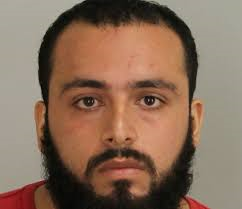Suspect in New York and New Jersey bombings spent three weeks in 2011 at Kaan Kuwa Naqshbandi madrassa, source says, amid questions of terrorism links. Ahmad Khan Rahami, the man suspected of placing bombs in New York and New Jersey last weekend, spent time in a religious seminary in Pakistan closely associated with the Afghan Taliban, according to a government official.
The 28-year-old, who was born in Afghanistan but became a US citizen, spent time at the Kaan Kuwa Naqshbandi madrassa on his two visits to Pakistan, a security official working for the government of Balochistan province told the Guardian.
Rahami spent three weeks in 2011 receiving “lectures and Islamic education” at the school in Kuchlak, a dusty cluster of villages 20km north of Quetta, the provincial capital of Balochistan, he said.
Kuchlak is a well-known hub for the Taliban, the Islamist movement that has waged a 15-year insurgency against local and Nato forces in nearby Afghanistan. It is home to many madrassas, the seminaries intimately linked with the Taliban, originally a movement of religious students.
US officials have revealed basic details about Rahami’s two visits to Pakistan, the first in 2011 when he spent a couple of months in Quetta and got married and almost a year in 2013 when he also made a car journey to Afghanistan.
But very little information has emerged from inside Pakistan about what Rahami did during his visits.
The government official, who did not wish to be named because he was speaking about a highly sensitive subject, said Pakistani security agencies have tried to “hide all the details of his visits to Quetta” and keep as much information as possible out of the media.
Rahami, he said, also visited other sensitive areas in the province, including Surkhab and Nushki, where former Taliban leader Mullah Akhtar Mansoor was killed by a US drone in May.
Pakistan has long been accused of playing a “double game” with the US, both supporting the Nato counterinsurgency in Afghanistan but also allowing the Taliban to use its territory a vital rear base.
A western expert on the Taliban said Abdul Samad, the Afghan owner of the Kuchlack madrassa, was an important local figure.
“The madrassa is a place where you have multiple Afghan Taliban going there and hanging out in [Samad’s] court, as well as active ISI officers,” he said, referring to the Inter-Services Intelligence (ISI) directorate, an army-run spy agency.
“Samad is the kind of person who should have been shut down long ago but enjoys a high degree of protection,” he said.
Despite being part of the mystical, Sufi strain of Islam which many hardliners abhor, Samad is highly respected by the movement, he said.
A Karachi-based cleric told the Guardian the school is a sizeable operation, with more than 200 students.
Despite several attempts to reach Samad for comment, the Guardian was unable to make contact with the madrassa.
Although the Taliban’s leadership is often described as the “Quetta Shura” many analysts consider Kuchlak to be the actual command centre for many senior members of the movement.
The Taliban’s white flags have been reportedly seen flying in the town’s graveyards and Shahbaz Taseer, a Pakistani kidnapped by militants in Lahore in 2011 and held for more than four years, was released in Kuchlak in March by the Taliban.
Rahami’s father Mohammad Rahami has said his son had grown increasingly interested in Islamist movements, watching Taliban and al-Qaida videos, and listening to their poetry. Rahami had also showed sympathy towards the Taliban, a former employer said.
Given the Taliban has long avoided entanglement in international jihad, insisting it is only interested in forcing foreign troops out of Afghanistan, it is unlikely Rahami was operating under instruction when he planted his bombs. A notebook found on Rahami when he was captured after a shootout on Monday suggests he may have been inspired by the Islamic State group.
But the claim Rahami attended an important Taliban-sympathising madrassa could be embarrassing for Pakistan at a time the country is under intense international criticism, not least from India which accused Pakistan this week of hosting “the Ivy League of terrorism”.
Anwar-ul-Haq Kakar, a spokesman for the Balochistan government, said that because more than 1 million Afghan refugees live in the province it is “difficult to know what sort of activity is being conducted by some individuals”.
“Filtering out the terrorist influences in such a huge community is a very difficult task,” he said.
Nor could the government be expected to be aware of a US traveller like Rahami who has “deep links in the host community”.
“If he was not spotted by the CIA and FBI or Homeland Security, then this shows that it is really global problem,” he said.

